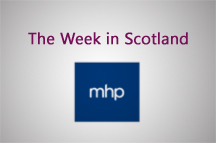 As he announced that he won’t be standing again for Westminster this week, Alistair Darling seemed somewhat forlorn as he reminded his party that it won the referendum. Despite its victory, the Scottish Labour Party has some major challenges. It has lost its leader and, as one Labour MP said, she “threw a grenade behind her” as she exited. Johann Lamont’s resignation – its timing and its manner – has exposed a party that is disunited and lacking clarity of purpose.
As he announced that he won’t be standing again for Westminster this week, Alistair Darling seemed somewhat forlorn as he reminded his party that it won the referendum. Despite its victory, the Scottish Labour Party has some major challenges. It has lost its leader and, as one Labour MP said, she “threw a grenade behind her” as she exited. Johann Lamont’s resignation – its timing and its manner – has exposed a party that is disunited and lacking clarity of purpose.
Labour’s woes in Scotland are reflected starkly in polls of Holyrood and Westminster voting intentions published this week. As nominations for the leadership and deputy leadership of the party were secured by hopeful candidates, opinion polls suggested that Labour’s hold on Scottish seats in the UK Parliament is in serious peril. An Ipsos MORI poll published at the end of last week put support for the SNP in Westminster voting intentions at 52%, equivalent to 54 seats. This was followed soon after by a YouGov poll for The Times that suggested 47 seats are heading to the SNP.
When nominations closed on Thursday, the three confirmed Labour leadership candidates and the two deputy hopefuls faced another poll and the prospect of further electoral decline – this time at Holyrood. A second Ipsos poll for STV News put SNP support up on the 2011 landslide, showing a 34-point lead over Labour in Scottish Parliament constituency voting intentions. Without a major turnaround in fortunes, the party has almost no chance of winning the next UK General Election and faces the loss of almost every constituency seat it currently holds at Holyrood.
 Whoever wins the party’s Scottish leadership contest has their work cut out for them. Jim Murphy remains the firm favourite with Kezia Dugdale tipped to be his deputy having secured the support of the parliamentarian block in Labour’s electoral college. It will be up to the membership to decide on the final victors - Lothian MSP Neil Findlay and North Ayrshire MP Katy Clark look set to win the support of the Union. The other contender, Sarah Boyack MSP, remains an outsider with little prospect of winning.
Whoever wins the party’s Scottish leadership contest has their work cut out for them. Jim Murphy remains the firm favourite with Kezia Dugdale tipped to be his deputy having secured the support of the parliamentarian block in Labour’s electoral college. It will be up to the membership to decide on the final victors - Lothian MSP Neil Findlay and North Ayrshire MP Katy Clark look set to win the support of the Union. The other contender, Sarah Boyack MSP, remains an outsider with little prospect of winning.
Each of the contenders must surely be considering the challenge they have signed up for and how they can steal back ground from the highly effective campaign machinery of the SNP. Once dominant across all levels of Scottish governance, the Labour party is clearly in decline. The job to reverse that deterioration is a huge one, it remains to be seen if it is even possible.
UK Labour leader Ed Miliband is now also facing growing pressure as his election coordinator Douglas Alexander calls for the party to “pull together” if it is to stand a chance of winning the 2015 election. For Scottish Labour, the referendum appears a pyrrhic victory. However, this merely exposes much deeper issues within the party.
The next few months will be crucial to the Labour Party in Scotland if it is ever to be a major political force again. Its new leadership will be key, and change from within will be its first, and possibly biggest, challenge.














